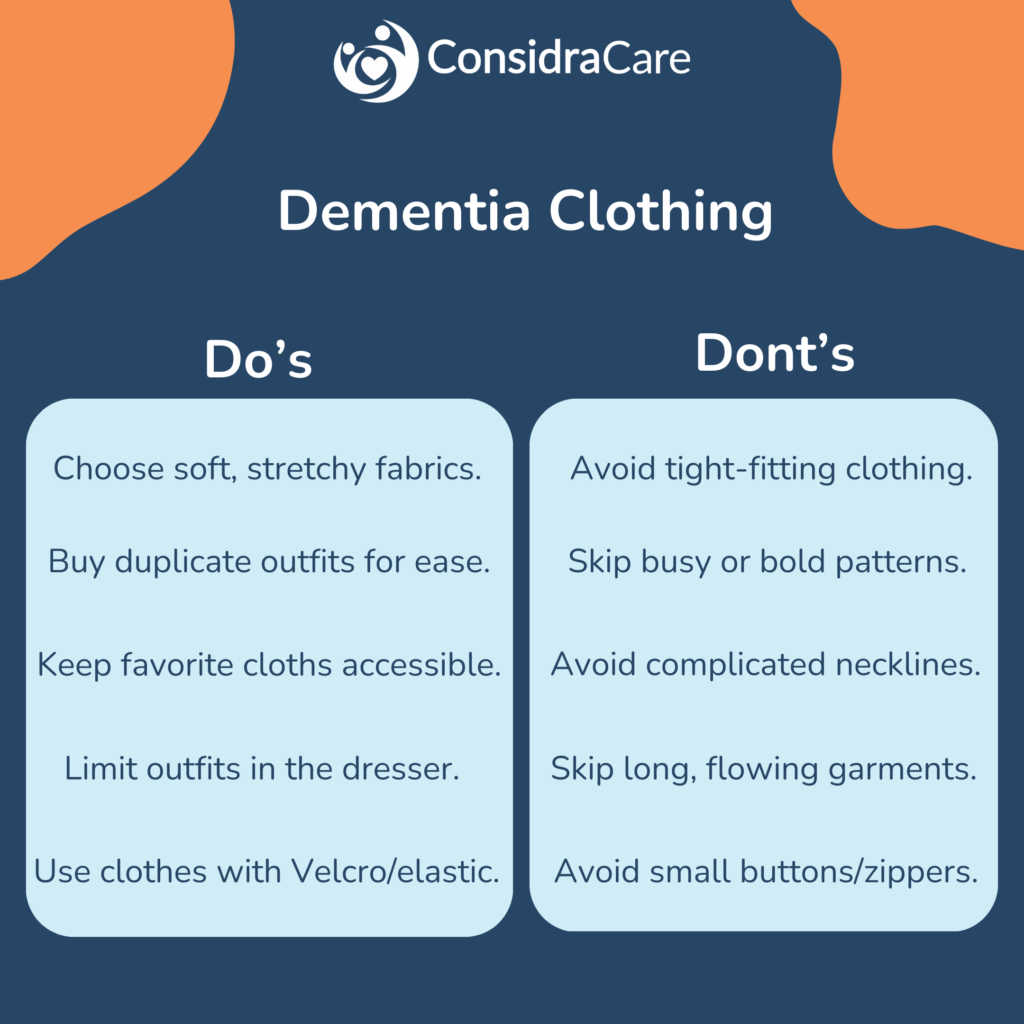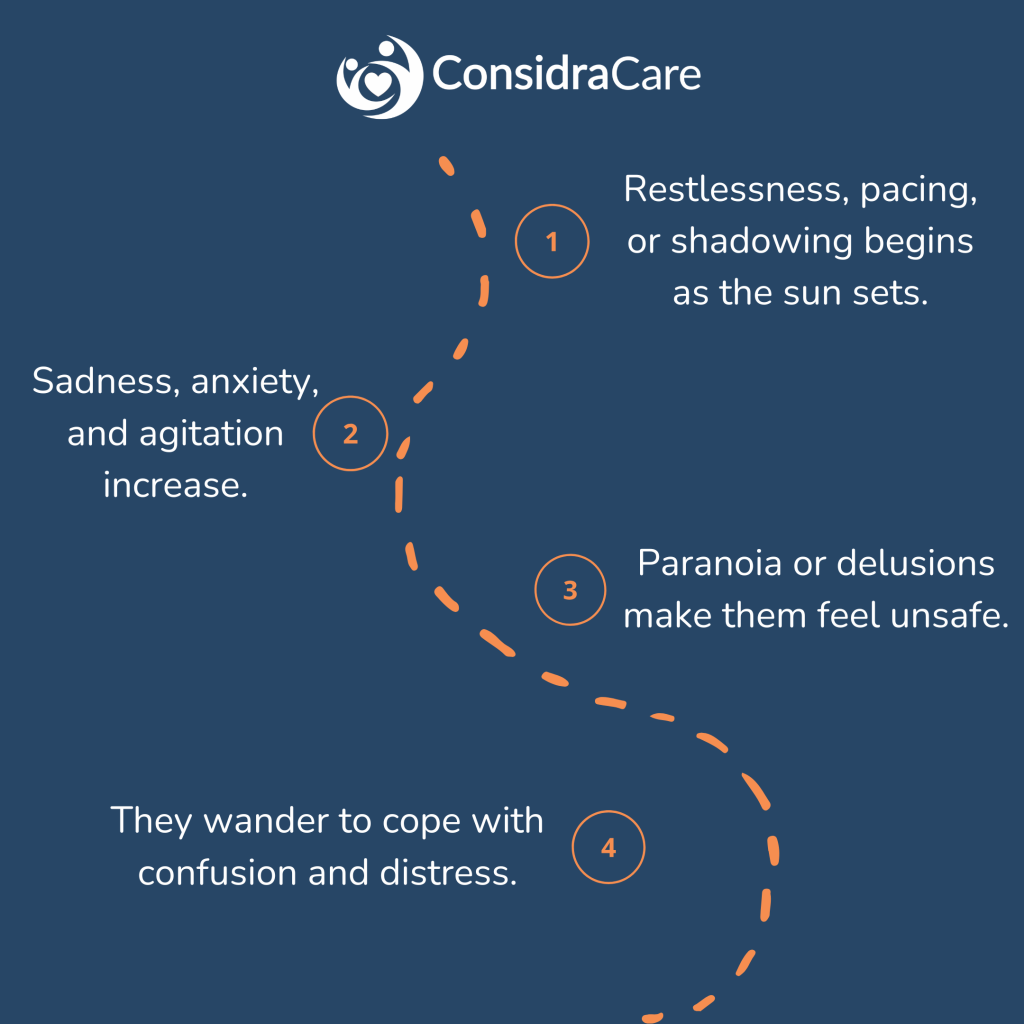As their primary caregiver, it’s important to understand how to reduce the risks of wandering and know what steps to take if it happens.

Table of Contents
ToggleHow to Prevent Wandering in Dementia Patients?
If you are caring for someone who has started showing signs of wandering or has wandered before, you need to stay alert at all times. Here are some steps you can take to prevent it from happening again.
1. Address the Causes:
Make sure your loved one has a simple, structured routine. Experts often suggest this because it keeps them busy, gives them a sense of purpose, and prevents boredom, which is one of the main reasons people with dementia wander. It’s also important to pay attention to signs like discomfort, fear, anxiety, or hunger. If these needs aren’t met, they might try to address them by wandering off on their own.
The goal is to keep them involved in small, meaningful ways so their mind doesn’t drift to other things. For example, ask them to help with everyday tasks like setting the table while you cook, folding laundry, or picking out clothes for the day. Simple activities like these can help them make sense of what’s happening around them.
When people with dementia encounter an unfamiliar environment—such as new objects, places, or even rearranged furniture—they may feel they are in the wrong place and try to leave. Additionally, loud noises and bright, vibrant lights can overwhelm and trigger their mind, increasing anxiety. As a result, they may wander in an attempt to find a place that feels familiar and safe.
2. Create a Safe Home Environment:
You can start making dementia-friendly modifications to your home. Start by putting up simple signs like “Do Not Enter,” “Closed,” or “Stop.” These signs guide your loved ones, reducing their confusion about where they should or shouldn’t go.
Labeling rooms, such as “Bedroom” or “Toilet,” can also make it easier for them to navigate the home. This is helpful because dementia often affects memory and spatial awareness, which can cause wandering.
Another helpful step is installing locks on doors and windows. Make sure the locks are either hidden or placed out of reach to prevent access. You can also hang items like bells on doors or install alert systems that let you know if a door or window has been opened. Moreover, keep all the triggers that indicate leaving the house out of sight, such as keys, coats, or anything that signals they are supposed to go outside to do something.
3. Supervise Them Like a Child:
Caring for someone with dementia is a lot like caring for a child, especially as their condition progresses.
You need to supervise them in new environments such as supermarkets, parks, restaurants, or malls, as they may become confused or disoriented. However, there will be times when you’re occupied with other tasks—whether it’s something for them, a household chore, or running an errand. To manage during these challenging times, you can consider in-home Alzheimer’s care. It’s a flexible and specialized option that helps ensure your loved one stays safe at home while giving you peace of mind.
4. Encourage Physical Activity:
According to the Alzheimer’s Society, keeping your loved one engaged in physical activity during the day can help prevent wandering incidents. This is because physical activity reduces restlessness, anxiety, and agitation, while also focusing their mind on something positive.
You can take them for a walk, involve them in simple household chores, or encourage them to participate in light activities like gardening or stretching.
What to do if They Wander Away?
Here is what you can do if they wander away.
1. Dress Them in Unique Color Clothing:
If your loved one doesn’t have a specific preference for clothing, dress them in solid or bright contrasting colors, especially when going outside. This makes it easier to spot them in case they wander.

2. Alert Neighbors and Local Authorities:
Let your neighbors and local police know about your loved one’s condition and their risk of wandering. Share important details, like places they might go, and keep a recent photo or video handy to help authorities find them quickly if needed. Programs like Project Lifesaver can also provide extra support by offering tools and services to locate your loved one in case they go missing.
3. Use Tracking Device:
In these situations, it’s important to make sure your loved one has some form of identification, like an ID with their name, address, and phone number. But there’s always a chance they might take it off or lose it. Tracking devices, like GPS bracelets or smart insoles, can be a good backup to help track their location. Just make sure to set them up ahead of time and choose something that’s comfortable for them to wear every day.
The Sundowning Journey: How It Can Lead to Wandering
Wandering is a behavior that often results from late-day confusion, commonly known as sundowning. Sundowning refers to the emotions, behaviors, feelings, and thoughts experienced by a person with dementia or Alzheimer’s as the sun sets.

How Considracare Can Help?
Caring for a loved one with dementia can be challenging, but you don’t have to face it alone. With our specialized in-home services, your loved one gets the care they need during this critical time. Our priority is to meet their needs and preferences while offering care that is kind and respectful. We provide support with daily activities, create safe routines, and maintain a calm environment to reduce confusion and wandering. This allows you to focus on other responsibilities with peace of mind, knowing your loved one is in good hands.
Reach out to us today for a free assessment!
Takeaways:
Wandering in dementia is common, and while you can’t always be there, the steps you take toward their safety can make a big difference. If you feel overwhelmed by all these steps, start small by giving them simple tasks to keep them occupied when you’re busy. Gradually, try to create a routine that addresses the causes of wandering and helps prevent it. As their condition progresses, consider modifying the home to make it safer. These actions will bring you peace of mind and help you provide the care they deserve.
FAQ’s
1. How to stop dementia patients from wandering at night?
Establish a calming bedtime routine with relaxing activities like soft music or reading. Ensure their room is safe, with dim lighting and minimal noise. Use door alarms, motion sensors, or child-proof locks to prevent nighttime exits. If restlessness persists, consult a doctor about sleep management.
2. How to prevent dementia patients from falling out of bed?
Install bed rails or bumpers, lower the bed, and place soft mats on the floor. Keep the bedroom clutter-free with good lighting. A firm mattress and a comfortable sleep space can also help.
3. How to stop dementia patients from undressing?
Dress them in secure clothing with back zippers or fasteners. Ensure their clothes are comfortable and not causing irritation. Redirect their attention to an activity if they start undressing. Check for skin discomfort and consult a doctor if needed.
4. Why do dementia patients get angry at caregivers?
Frustration, confusion, or feeling out of control can cause anger. Stick to a consistent routine, speak calmly, and avoid rushing them. Patience and empathy can help reduce their distress.

Fakiha is an experienced writer at ConsidraCare with an optimistic interest in life. She has a proactive approach to improving health and wellness for seniors. She offers well-researched and thoughtful information to help individuals make informed healthcare decisions for themselves and their loved ones.



